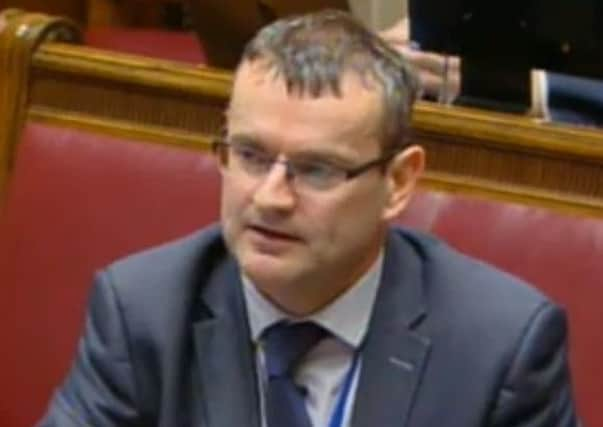RHI inquiry: DETI chose RHI over £300m cheaper scheme to save £3.5m, says official


Shane Murphy, who at the time when the RHI scheme was being set up was senior principal economist at the Department of Enterprise, Trade and Investment (DETI), yesterday spoke bluntly as he gave evidence to the public inquiry into how the green energy scheme imploded due to a flaw which led to a perverse incentive to waste heat.
The economist said that in his mind he was clear that the officials designing the RHI scheme favoured that option over a far cheaper alternative largely due to the stream of taxpayers’ money out of which the relatively small administration costs were to come.
Advertisement
Hide AdAdvertisement
Hide AdMr Murphy had a limited role in the scheme which mainly centred on him being part of DETI’s ‘casework committee’ which approved the scheme prior to it going to the then minister Arlene Foster for final approval in 2012.
The experienced economist said that he had questioned officials in DETI’s energy division on why they were so keen to launch the RHI scheme when an alternative – known as a ‘challenge fund’ – would, according to the consultants who advised the department, produce more renewable heat while costing about £300 million less than an RHI scheme.
The inquiry has already been told by the consultants, CEPA, that they wanted to recommend the challenge fund but “negotiated” their supposedly independent findings with DETI to fit with what the department wanted, something officials dispute.
Mr Murphy said that DETI officials had argued that although the RHI would be far more expensive in the long term, it would be cheaper for the department to administer in the short term – about £1.5 million as opposed to £5 million for the challenge fund – partly because they could ‘piggy-back’ on the existing GB RHI scheme by using its administrator, Ofgem.
Advertisement
Hide AdAdvertisement
Hide AdMr Murphy argued it was not the role of an economist colleague to query the fact that the challenge fund would have saved taxpayers hundreds of millions of pounds in the long-term.
Inquiry chairman Sir Patrick Coghlin repeatedly queried whether one of the economists should have highlighted that issue.
But Mr Murphy said that it was not his role to raise that because it was for other officials to know whether the department could afford to administer the cheaper scheme.
In this case, he said that the officials who knew about DETI’s budgetary situation had taken the decision that they could not afford to run the scheme.
Advertisement
Hide AdAdvertisement
Hide AdMr Murphy admitted it would be “strange to the outsider” that the system was set up in that way.
Sir Patrick asked if it could be right that if officials told the economists that the challenge fund was not affordable because it would cost £5 million to run that the economist could then completely ignore the fact that there would be a £300 million saving by going with the challenge fund.
Mr Murphy said: “Certainly if an economist is told that certain options are not feasible and that one of those reasons is because of affordability, that would narrow down...”
Sir Patrick said: “This is the way this decision-making process [in the civil service] works, is it?”
Advertisement
Hide AdAdvertisement
Hide AdMr Murphy said that an economist “is not there to push options on to the table that he’s not confident to push on to the table”.
Inquiry counsel Joseph Aiken asked him if the ‘non-monetised benefits’ which RHI was said to involve – such as providing a long-term signal to the market – “could trump £300 million worth of difference”.
Mr Murphy replied that his understanding of it at the committee was that although the officials proposing the scheme cited other non-financial benefits, he believed that the administrative cost was the key factor for them in favouring the RHI over a challenge fund.
In a written statement, he said that DETI’s energy division had told the committee that the administration costs for the cheaper alternative were “prohibitive and affordable within the DETI budget”.
Advertisement
Hide AdAdvertisement
Hide AdMr Aiken said that to an outsider looking in, they would think “spend £300 million or just £5 million? Hold on a minute, we’ll just spend £5 million” but that the way in which public sector spending is organised can contribute to that outcome.
Mr Murphy later accepted that in wider terms that system “can look very strange – but it’s also pretty rigid and there’s little scope to move things around between different pots of money”.